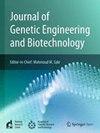基于植物烯去饱和酶(PDS)基因破坏的鸽豌豆CRISPR/Cas9基因组编辑框架的构建
IF 2.8
Q3 Biochemistry, Genetics and Molecular Biology
Journal of Genetic Engineering and Biotechnology
Pub Date : 2025-02-06
DOI:10.1016/j.jgeb.2025.100465
引用次数: 0
摘要
在亚洲次大陆,鸽豆是一种重要的豆科植物,具有很高的营养价值、农业和经济意义。尽管具有高产潜力,但由于几种非生物和生物胁迫,其生产力仍然停滞不前。为了缓解这些挑战,基因组编辑等生物技术干预提供了有希望的解决方案。为此,开发一种特定物种的编辑工具包对于像鸽子豆这样的顽固性物种至关重要。本研究建立了以植物烯去饱和酶(phytoene desaturase, PDS)基因为靶点的CRISPR/Cas9基因组编辑系统。我们开发了鸽子兼容的载体组件,包括CcU6_7.1启动子和马铃薯泛素启动子驱动的可适应Cas9基因,创建了鸽子特异性CRISPR/Cas9二元载体(PP_CRISPR_pCAMBIA2301)。该系统通过农杆菌介导的植物根尖分生组织靶向和离体胚胎轴外植体转化进行了验证,并通过白化/漂白表型证实了基因敲除。植物内和体外转化的编辑效率分别为8.80%和9.16%。PCR分析证实T-DNA整合,序列分析证实PDS基因突变。在植株转化发育突变体的T1代植株中证实了表型的稳定性。该系统可支持功能基因组学研究和其他豆科植物的性状改良。本文章由计算机程序翻译,如有差异,请以英文原文为准。
Establishing a CRISPR/Cas9 genome editing framework in pigeonpea (Cajanus cajan L.) by targeting phytoene desaturase (PDS) gene disruption
Pigeonpea is an important legume valued for its high nutritional, agricultural, and economic significance in the Asian subcontinent. Despite its potential for high yield, productivity remains stagnant due to several abiotic and biotic stresses. To mitigate these challenges, biotechnological interventions like genome editing offer promising solutions. Towards this, developing a species-specific editing toolkit is crucial for recalcitrant species like pigeonpea. In this study, we established a CRISPR/Cas9 genome editing system targeting the phytoene desaturase (PDS) gene. We developed pigeonpea-compatible vector components, including the CcU6_7.1 promoter and an amenable Cas9 gene driven by the potato ubiquitin promoter, creating a pigeonpea-specific CRISPR/Cas9 binary vector (PP_CRISPR_pCAMBIA2301). The system was validated by Agrobacterium tumefaciens-mediated apical meristem-targeted in planta and in vitro embryonic axis explant transformations, with gene knockout confirmed by albino/bleached phenotypes. Editing efficiencies were 8.80% and 9.16% in the in planta and in vitro transformations respectively. While PCR analysis confirmed T-DNA integration, sequence analysis identified PDS gene mutations. Stability of the phenotype was demonstrated in T1 generation plants of in planta transformation-developed mutants. This system may support functional genomics studies and trait improvement in pigeonpea and other legumes.
求助全文
通过发布文献求助,成功后即可免费获取论文全文。
去求助
来源期刊

Journal of Genetic Engineering and Biotechnology
Biochemistry, Genetics and Molecular Biology-Biotechnology
CiteScore
5.70
自引率
5.70%
发文量
159
审稿时长
16 weeks
期刊介绍:
Journal of genetic engineering and biotechnology is devoted to rapid publication of full-length research papers that leads to significant contribution in advancing knowledge in genetic engineering and biotechnology and provide novel perspectives in this research area. JGEB includes all major themes related to genetic engineering and recombinant DNA. The area of interest of JGEB includes but not restricted to: •Plant genetics •Animal genetics •Bacterial enzymes •Agricultural Biotechnology, •Biochemistry, •Biophysics, •Bioinformatics, •Environmental Biotechnology, •Industrial Biotechnology, •Microbial biotechnology, •Medical Biotechnology, •Bioenergy, Biosafety, •Biosecurity, •Bioethics, •GMOS, •Genomic, •Proteomic JGEB accepts
 求助内容:
求助内容: 应助结果提醒方式:
应助结果提醒方式:


